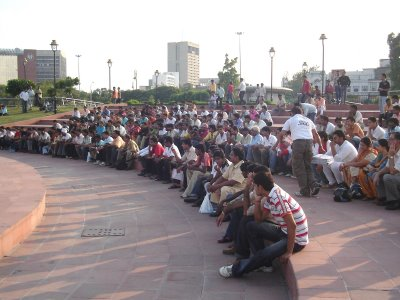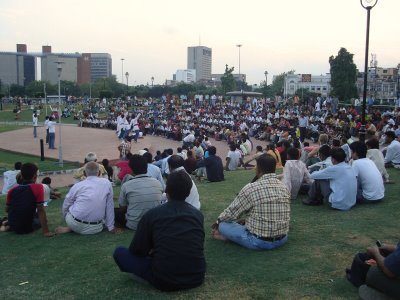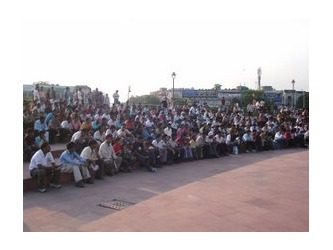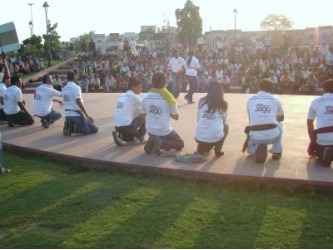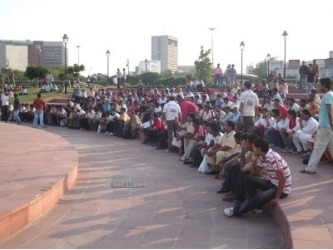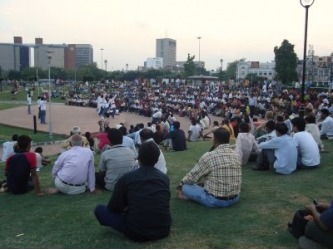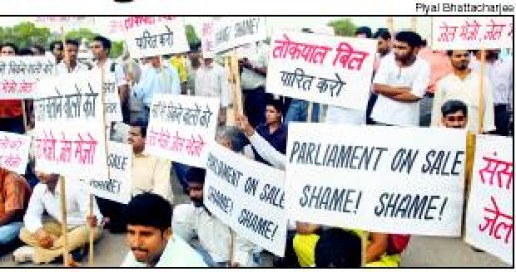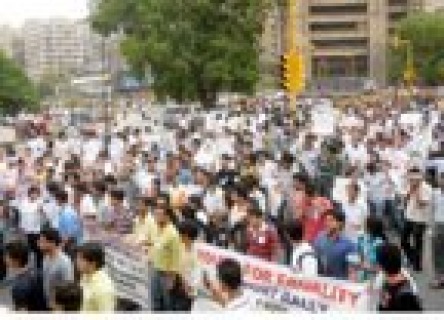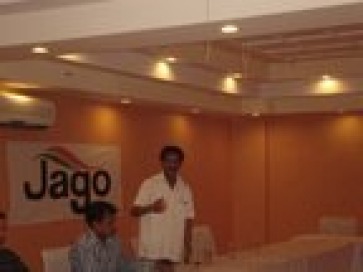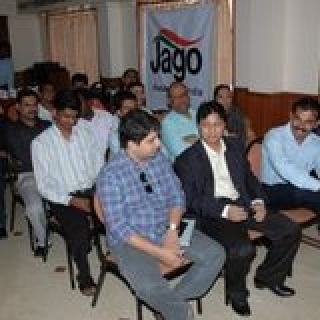MAHA RALLY AND HUGE GATHERING BY JAGO PARTY
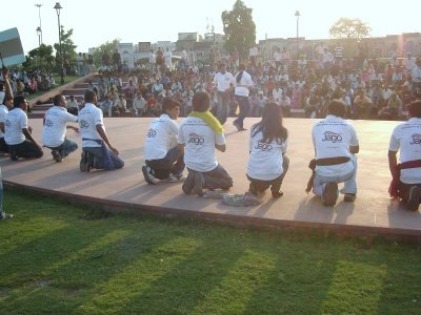
JAGO PARTY is a registered political party & was registered by the EC on the 28th of Jan this year i.e. 2008. It is a political party formed by a group of educated apolitical citizens who are passionate nationalists. It's main agendas are : I. Reservation for none. Job for all through free English medium education. II. Death sentence for terrorism, corruption, murder & rape. Court judgment in three months. III. Banish corruption infected subsidies. All voters will get Rs. 600/- per month. The party's website is www.jago.in Today JAGO conducted it's first ever grassroot programme through it's highly successful JAGRUKTA RALLY. More than 1000 concerned citizens participated in the Rally. The Rally started at 11:30 AM from Badarpur & ended at Pragati Maidan at 4:30 PM. The participants in the rally thereafter gathered at the Central Park, Connaught Place at 5:00 PM & organized two fabulous "nukkad nataks" to awaken the sleeping masses which was greatly applauded by the audience. Through these nataks Jago party narrated to the masses the quality of independence we are exercising & the need to look at fresh political alternatives to bring in REAL CHANGE.One of the party coordinators Sh. Birendera Soni urged the public not just to wake up but to AWAKEN themselves. The programme ended with a fiery speech by the national secretary of Jago party - Sh. Denson Joseph who urged the people to start using tools like RTI & make the system accountable.He also stressed that "VOTE IS YOUR WEAPON" & if exercised with integrity it can bring radical changes in the society.
SOURCE-PRESS RELEASE OF JAGO
jago in action
Mission
The mission of Jago Party is to make India a very safe, strong and rich country.
We want to achieve our goal by using and strengthening democratic institutions.
Right now, India is not a safe country: terrorism has launched an undeclared war against India. Blasts after blasts are taking place in the country, but state and central governments are busy blaming each other. There is a crime everywhere. No person in this country feels secure. Our neighboring countries are engaged in subversion within our country, and the present government is watching this helplessly.
Economically, even after liberalizations made in 1991, India is still a government-dominated economy where the underlying vision is: “the rich are “exploiters” of the poor, tax them as much as you can and transfer the tax money to the poor through government schemes. Let government do business in maximum possible areas to “save the interests of the poor”. Reserve maximum government jobs and facilities for socially and economically backward classes to help the poor further.”
All political parties are supporting this policy. Such a distorted vision has led the country to the mire of corruption, inefficiency, neglect of customers’ needs, neglect of merit, unemployment, poverty and so on.
Jago Party strongly disagrees with this vision.
We believe that the rich and entrepreneurs are not exploiters of the poor, but creators of wealth through industries and commerce where people gain productive employment; where consumers get better products at lower prices; where there is a constant improvement in productivity and where anybody can become rich by making right kind of efforts and acquiring right type of skills.
The exploitation theory on which communism and socialism is based and on which Nehruvian variety of “welfare” state in India was structured and still being pursued by all Indian political parties has proved to be totally false.
Let us explain how.
The essential nature of man is such that he works for himself & his family’s interests first, and only afterwards for the society. So, an ideal economic system should promote pursuit of self-interest by all individuals in such a way that it leads to the maximum benefit of the society as a whole.
The fundamental presumption of communism / socialism was that if means of production and distribution is owned and “managed by the society” (in practice, by a few politicians) for the “benefit of the society” (in practice, to be defined by a few politicians), everybody would work and live for the society ignoring his personal self-interest. But the practical experience of the last 30 years shows that such a system does not work on these intended lines. This is because most men are motivated to work only for satisfying their personal and families’ interests, not for the interest of the society or organizations. They would serve others’ interests only if it ultimately serves their own interests.
Only under a free market economy, where individuals are given freedom to engage in economic activities with others with mutual consent, the individual's pursuit of his own economic self-interest simultaneously benefits the economic self-interests of all others.
If I want to earn profit, I must satisfy the needs of my customers, which can be done only by providing them better goods at lower prices. This obviously benefits all my customers as well as me. If I want better management and productivity, I must hire the best managers and pay them more. This obviously benefits my employees as well as me. Thus, in allowing each individual to act unhampered by government regulations, free market economy causes wealth to be created in the most efficient manner possible which ultimately raises the standard of living, increases the economic opportunities, and makes available an ever growing supply of products for everyone. The free-market operates in such a way that as one man creates more wealth for himself, he simultaneously creates more wealth and opportunities for everyone else, which means that as the rich become richer, the poor also become richer.
Thus, the traditional wisdom that in the free market economy, the interests of the entrepreneurs and customers / employees are opposed to each other has been proved to be false. This is why all communist states like Soviet Union, China etc have abandoned their systems and are gradually moving towards free market economy.
Far from being exploiters, the true function of capitalists and businessmen is to raise the productivity, and thus the real wages, of manual labor by means of creating, coordinating, and improving the efficiency of the division of labor. By continuously improving the efficiency of labor, capitalists and businessmen are responsible for raising wages and creating employment which serve to raise the standard of living of everyone. Furthermore, by funding research and capital investments, corporations and capitalists make possible all of the modern day conveniences, from laser surgery to orchestra halls that most people take for granted every day. In fact, since capitalists make available so much life-saving and labor-saving technology to so many people, they should be regarded as some of mankind's greatest benefactors.
A few capitalists and businessmen have done more to help mankind live a more enjoyable life (indeed, most people would not even be alive today if it weren't for capitalists) than all humanitarians, social workers, and clergy men combined. If one considers human life a value, then they should regard capitalists as one of its greatest promoters.
It is generally alleged that in the free market economy, those who are born without wealth and opportunities are in a permanently disadvantageous position.
Fact is just the opposite. The economic history provides countless instances of people who improved their lives through work and ability. There were millions of immigrants who came to America and worked their way up to the middle class or higher. One of the great historical examples was Andrew Carnegie, who rose from a penniless sweeper at a steel mill to revolutionize the steel industry and make one of the largest fortunes of his day.
The reason why free market economy allows people to rise by their own efforts is that it is driven by only one fundamental consideration: profit. But profit comes from an increase in the production of wealth: it comes from inventing a new product, producing a good more efficiently, promoting it to a wider market, etc. It comes from doing things better, faster, and smarter than before. This means that free market economy offers an open field to anyone who works hard to improve his skills—and it offers riches to anyone who thinks hard and comes up with new and better ideas. It is under such an economic system, for example, that a company like Microsoft or Infosys creates scores of millionaires out of individuals whose qualification is not inherited wealth or social connections, but only the ability to create and sell computer programs.
A poor but meritorious and determined student can always rise up by hard work. There would be no dearth of financial support to him by way of loan, scholarship etc. If such an economy is allowed to mature, there would be several companies which would like to invest in such students financially so that they may get a good return when these students start earning. Nevertheless, till such maturity happens, government and private charity institutions may always assist such students financially.
Experience of Indian economic system for the past 60 years:
Impressed by the initial progress made by the socialist Soviet Union, Jawahar Lal Nehru, the then Prime Minister of India, structured Indian economy on the “socialistic pattern”, with “commanding heights of the public sector”. This vision started a license-quota-permit raj where every aspect of economy was controlled by the government. Though some liberalization took place in view of practical problems in 1991, the basic structure remains the same till today.
However, last sixty years of Indian experience has abundantly proved that wherever government has tried to do business, it has failed miserably due to its inherent inefficiency, corruption and indifference to the interests of consumers. Wherever government has promoted private enterprise, consumers have benefited in terms of quality of service as well as price – as, for example, in telecom, civil aviation, construction, telecasting etc. Wherever government continues to do business, consumers are suffering in terms of shortages and poor quality, as for example, power, education, roads, trains, management of cities etc.
It has been also our experience that the money left with the taxpayer generates more employment and wealth through private investment than the money collected by the government as tax and invested by the government as a welfare scheme to the poor. This is so because there is leakage (corruption) in revenue collection process as well as well as in public investment process.
Causes of inefficiency of the government & success of private enterprises: Government and public sector undertakings are generally inefficient and corrupt because their management and employees are assured of salary, promotion and perks even though their customers are not satisfied. Taxpayers’ money collected by governments keeps on funding their inefficiencies. On the other hand, private sector must satisfy their customers, otherwise they would not be able to make profit and survive. Thus, efficiency is inherent in the private sector and inefficiency is inherent in government and public sector by their very nature.
Besides, public investment process is not governed by demand and supply rules of the market economy. Hence, they are decided by arbitrary yardsticks. These schemes are conducted by government babus who have no experience in entrepreneurship. Hence, such investment does not generally create lasting capital goods needed by the economy and thus the entire money is wasted. The poor gets some wages but they remain poor, as they do not become a part of the system which generates wealth and employment on its own.
Hence, in view of these experiences, Jago Party strongly believes that government activity must be limited to the bare minimum: maintenance of law & order, enforcement of contracts, justice, defense, currency, environment, research, creation of level playing field for all and overall facilitation of the economy (including prevention of unfair business practices). The rest must be left with the private sector. Taxes must be reduced so that there is more private investment. All populist government schemes – so full of corruption, wastage and inefficiency – formulated in the name of the poor must be dismantled, because the poor would not get benefit by this method. They would be benefited truly only by accessing a free market economic system which generates productive employment on its own. Reservation and other forms of discrimination based on caste or religion in the name of the welfare of the poor must stop immediately.
Besides, whatever limited areas have to be managed by government must also be tried to be as much efficient as possible by privatization/outsourcing of front offices, computerization, empowerment, delegation of powers and putting in place a strong mechanism for imposing penalty for the inefficient & the corrupt.
Keeping in view this vision, Jago Party has formulated its plan of action (manifesto), which is given below.
OUR MANIFESTO
A. RESERVATION FOR NONE, JOB FOR EVERY ONE THROUGH FREE ENGLISH EDUCATION.
Jago Party would abolish all reservations (also other discriminations) based on caste, religion, province etc. through promotion of private enterprises to enable them to become a proud earning member of the economic system.
As to education of the children of the poor, government would bear the full cost /supplement the cost of education up to class 12 for any good standard private school. For college and vocational education, students would be given soft loans, which they would repay in easy installments after they start earning. Many companies will come forward to train & hire. No dearth of jobs in India & abroad, if quality of education is good.
All children would be given education in English medium right from the beginning so that they have a full mastery over the language. It would give them easy access to the best possible technical and management knowledge and thus equip them to get maximum and best jobs in the Indian and world market. It would also provide them huge business opportunities on a global scale.
However, in addition to English, one local language (generally the mother tongue) would also be taught as a subject throughout the school so that children are able to develop a mastery over this language also. This would enable them to be connected with their own people in a more intimate way and help them understand Indian/local culture in a better way.
If a parent still wants his child to study in the medium of only the local language, he would be free to do so.
There would be only one syllabus for all schools and only one all India level examination conducted by one board at class 12.
The education system would be changed in such a way that it not only enables a student to be skilled for a job, but also promotes the joy of learning, scientific thinking and experimentation, rather than just memorizing the given information and passing examinations. It should enable students to become aware of the major cultures of the world, problems of the society and life and solve those problems in innovative & scientific ways.
B. IMPROVEMENT IN LAW AND ORDER BY:
1. Elimination of terrorism - by -- legislation and strict implementation of a very strict anti-terrorism act (like POTA); an integrated all-India anti-terrorism police cadre with maximum autonomy; strengthening of intelligence system; all infiltrators coming from Bangladesh etc to be expelled and insurgency in North East and Kashmir to be eliminated.
2. Providing justice in time - by -- giving more powers to the police; increasing the number of policemen and courts; filling up the vacancies in police and courts; all disputes to be decided within 3 months by all courts; only one appeal to be allowed.
3. Capital punishment for major crimes – Anyone committing the heinous crimes like terrorism, murder, rape, kidnapping and dacoity must be punished with death.
For checking other crimes (such as theft, eve teasing, traffic rules violations, littering in a public place etc), a study would be made about the legal and punishment system (flogging, fining etc.) prevalent in relatively crime-free places like Singapore, Dubai etc and similar system would be adopted in the country with suitable adjustments.
4. More accountability for senior government officers / Ministers – Home Minister / SP/ chief minister would be held responsible for any deterioration in law & order situation. They will be prosecuted for dereliction of duties.
5. Dismantling of discriminatory or outdated laws – There are several laws in this country which are either positively discriminatory or outdated. A review of all these laws will be made and such laws would be repealed.
For example, today, most women end up using Dowry Prohibition Act (originally passed in 1961 and amended twice in the 1980s), along with Section 498A of Indian Penal Code to book husbands for maltreatment even if dowry is not the cause of marital conflicts/breakdown. This anti-dowry law has not curbed giving and taking of dowry. It has only provided a strong weapon for revenge in the hands of wives against their husbands and in-laws, whether or not their conflict is over dowry.
C. ELIMINATION OF CORRUPTION –
Corruption arises in a situation where powers are given without commensurate responsibilities for customer satisfaction. This kind of situation arises mostly in government, because there officers have been given powers to raise objections or deny due benefits to customers, but their pay & perks are not dependent on customers (but on coercive tax). Government domain therefore would be limited to law & order, justice, defense, currency, foreign relations, taxation, security-related industries, scientific research and overall facilitation and monitoring of economy. Besides, stringent punishment up to death penalty will be imposed on the corrupt.
D. FINANCIAL AID OF Rs 600 TO ALL VOTERS –
All voters will get Rs. 600/- per month: Government wastes huge money on subsidies of food, electricity, fertilizer etc., 85% of which is siphoned away by middlemen. Jago Party will discontinue all such subsidies. This money instead will be paid in cash to all voters @ Rs.600/- per month. Let people decide what they need. There would be no need for a separate ration card. Voter ID card would be enough. The amount would be directly paid through bank account or smart card. No middle man, no corruption.
E. CREATION OF WEALTH BY:
1. Reduction in government activities – Keeping in view our philosophy enunciated above, Jago Party would restrict government activities only to law & order, justice, defense, currency, foreign relations, taxation, security-related industries, scientific research and overall facilitation and monitoring of economy. It would have an overall supervision of the economy to ensure fairness and facilitation for private enterprises. Hence, all other activities such as those pertaining to education, municipality, hospitals, records management etc currently undertaken by the government would be replaced by private commercial enterprises. Staff working in government would be retrained and got absorbed in similar private enterprises.
2. Disinvestment of Public Sector Undertakings – Lakhs of crores of rupees has been sunk in public sector in India without getting proportionate returns. Most of these units are inefficient, corrupt and loss making. Jago Party would sell these undertakings to the private sector through global biddings in a transparent manner and the money obtained would be invested in a profitable way so that there is a continuous inflow of returns. This inflow would enable reduction of tax rates in India, which in turn would promote more domestic private enterprises and attract more foreign capital for investment. Staff working in these public sector undertakings would not be retrenched and they would be absorbed in the same industry or similar industries after training, if necessary, by private enterprises.
3. Electricity & Railways will be privatized: 24 hours electricity to all town & villages can be provided by privatization. That too can be at only Rs. 2/- per unit. There are many villages in India, where electricity did not reach in hundred years, but mobile phones reached in ten years. It clearly shows benefit of privatization over government control.
Similarly we never get reservation in Railways when we urgently need it on short notice. People travel like animals. Platforms and trains are dirty, congested, chaotic and indifferent to the needs of customers. Once privatized, there would be enough supply of seats and berths so that the need of reservation would be reduced. Train journey would become faster and more comfortable.
4.Reduction in tax rates – At present, India has too many types of taxes such as Income tax, Corporate tax, Wealth tax, Sales tax, Service tax, Excise duty, Customs duty, Fringe benefit tax, Gift tax, Luxury tax, Octroi, stamp duty, Revenue stamp etc with rates as high as 30% for highest slabs in Income tax and 33% for Corporate tax. Since Jago Party would reduce government activities and eliminate loss making public sector undertakings, its need to raise revenue by higher rates of taxation would be much less. Besides, the earnings from disinvestment capital (as explained above) would also reduce the need to tax at high rates.
Hence, Jago Party would reduce the number of types of taxes and no tax rate including Income Tax would be more than 10 %. Persons having annual income up to Rs 4.0 lakh would be fully exempted from Income tax. Tax laws would be simplified by abolishing all exemptions and exceptions. The increase in economic activities would compensate the loss of revenue & will increase job opportunities. Low tax rate would mean better compliance, more revenue and less corruption.
5.Simplification of the procedure for production of wealth – All reservations for production of certain items only under small scale industries, cottage industries etc would be abolished so that fresh capital, enterprise and technology pervades all the sectors of production of wealth and makes Indian economy globally more competitive in all sectors.
Besides, entire India would be one market where anybody can invest anywhere any amount without any license from anybody. Every entrepreneur would be given the right to hire or fire anybody anytime and buy or sell anything at any price. Everybody would be free to earn and own wealth as much as he wants without any ceiling.
Even roads, ports and other capital intensive projects would be created by private enterprises on Build, Own and Operate (BOO) basis. Based on this principle, even new private spacious cities with eco-friendly, ultramodern facilities and efficiencies can be developed by private entrepreneurs, thus rendering the present municipality-led dirty, congested and slum-like towns and cities redundant. Similarly, corporate and contract farming across the country with latest technology and genetic engineering can revolutionize the present outdated farming structures and practices and make agriculture a new thriving industry.
The function of the government would be to see that public interest is not violated by any enterprise; that no pollution or deforestation takes place by any industry and that people actually sell what they claim to sell. Besides, government would hire experts to benchmark the quality of a product, grade the existing private enterprises of a product and impose penalties on those who adopt unfair practices. The government would also function as a pioneer in new ventures by promoting private enterprises in those areas.
F. CHECKING POPULATION GROWTH:
No economy can absorb unlimited human population. Hence, there is an urgent need to check growth of population in India where we find more and more people competing for every thing everywhere. For this, Jago Party would vigorously campaign for family planning and put a series of disincentives on anyone who produces more than two children. These disincentives would include debarring such parents from voting, getting any government financial aids and holding any public posts. However, not voting or stopping financial aid would not apply immediately to the existing parents having more than two children. It would apply to parents having more than two children from a future date.
Ban on child-labor will be strictly enforced.
G. REDUCING POLLUTION:
Stringent rules would be made and executed to ensure that there is no air, water, land or noise pollution within the country; that natural resources are recycled; that the country has more than the minimum required forest cover and so on. Private sector would be guided to use and invent more Green technology and severe penalties would be imposed on those who violate pollution norms. India would join the global campaign to check pollution (and try to achieve the best mileage off the carbon credit schemes/payouts) and put pressure on countries which do nothing to check it.
H. STRENGTHENING SECULARISM:
Secularism means that government should not interfere in or promote any particular religion. Hence, Jago Party would abolish all discriminatory benefits based on religion, caste etc. No governmental plan would be based on promoting economic or political or educational interests of a particular religious community.
If religious / political leaders teach hatred against other religions, stern action would be taken against them. In order to promote inter-religious understanding, inter-religious dialogue and frank discussions would be started on TV channels. Similarly, in order to promote scientific attitude, discussions between science and religion would also be organized on TV channels. Inter-religion, inter-caste marriages will be encouraged.
I. STRENGTHENING DEMOCRACY BY:
1. Eliminating all fraudulent voting practices. Entire voting process would be digitized. All eligible voters would be issued electronic cards after proper address verification.
2. There would be no reservation for any caste or community for any constituency.
3. Working for committed governance, where there is a clear separation of functions among legislative, executive and judiciary wings of the government. This would ensure stability of the executive branch and prevent dilution of policies under the pressure of vested interests sometimes represented by legislative members.
4. Working for division of bigger states into smaller states so that there is more efficiency in governance.
5. Abolishing all the second houses of representation (Rajya Sabha and Vidhan Parishads). They do not serve any useful purpose and are mostly dens of vested interests.
6. Giving NRIs the right to vote in Indian elections by postal ballot. Granting them dual citizenship.
7. Authorizing voters to recall their representatives at any time on grounds of unsatisfactory performance or conduct.
J. PROMOTING INDIVIDUAL FREEDOM:
Jago Party believes that so long as an individual does not snatch away someone’s life, property and dignity by force or deceit, he should be allowed to do whatever he likes. Hence, we oppose any interference of the government in matters related to sex, marriage, divorce, inheritance, life style, fashion, dance, music, profession, religion etc. Hence, prostitution, homosexuality, divorce by mutual consent etc must be beyond the scope of the government. Jago Party would abolish all laws interfering with these freedoms.
K. POSITIVE ALIGNMENT FOR HUMAN RIGHTS ACROSS THE WORLD:
For the last sixty years, India has been following the policy of non-alignment with no fruitful results. Now, the time has come for India to make positive military and political alignment with democratic countries of the world in order to stop human rights violations.
Non-alignment believes in non-interference in the affairs of other countries, but this is a very cruel policy. Suppose a regime oppresses its people or harbors terrorists. Should other countries do nothing about it simply because it is interference in the affairs of the regime? Say, for example, the suppression of Tibetans’ aspirations by the Chinese government or suppression of the demand for democracy by the people of Burma by their government. No, we should not. Now the world has become civilized enough to make a positive military and political alliance and overthrow such oppressive regimes by persuasion and sanctions, if possible and by force, if necessary. This kind of united action requires positive alliance among all democratic and freedom loving countries.
Only elimination of oppressive and terrorism-sponsoring regimes would facilitate emergence of a world order based on democracy, secularism and free market economy and would ultimately lead to a world government. Only when a world government comes into existence, all border conflicts among countries would stop and there would be no need for separate military establishments for each country. That would save tremendous resources. That would be the beginning of real peace and prosperity on global scale. Jago Party dreams of such a beautiful world and is committed to make it a reality.

